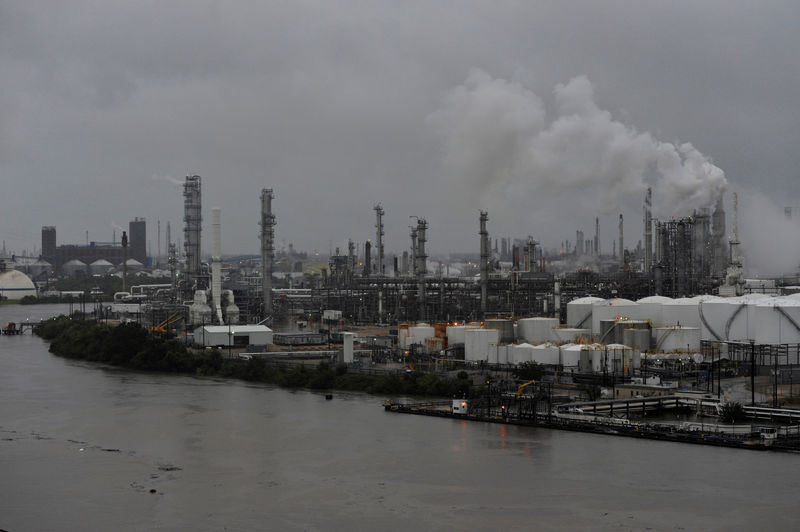By Erwin Seba
HOUSTON (Reuters) - Record rains and flooding from Tropical Storm Harvey triggered more oil refining outages in Texas on Tuesday, bringing the total offline to more than 16 percent of overall U.S. capacity as the storm took aim at plants along the Louisiana coast.
As the storm moved up the Gulf Coast, supply shortages emerged, as major pipelines carrying gasoline, diesel and jet fuel started to adjust deliveries or close lines outright due to lack of supply.
About 3 million bpd of U.S. refining capacity had already been shut, with more shutdowns expected. Restarting plants even under the best conditions can take a week or more.
The U.S. Gulf Coast is home to nearly half of domestic refining capacity, with some 5.6 million barrels per day (bpd) of capacity in Texas and 3.3 million bpd in Louisiana.
More refinery closures were expected, as parts of Texas have received more than four feet of rain. Fuel prices were expected to keep rising as refining capacity remains down and pipelines run short. Explorer Pipeline, which runs from Texas to Chicago, will shut two lines early Wednesday.
"These closures are already impacting markets, with crude prices lower on a perceived drop in demand and gasoline prices spiking in response to lower supply," said Sandy Fielden, director of oil and products research at Morningstar.
Colonial Pipeline, the key artery sending gasoline up the East Coast, was still shipping barrels there, but has faced flooding at origination points in Texas.
The Northeast was already dealing with reduced supply. Philadelphia Energy Solutions, the region's largest refiner, said it has sold all its available regular gasoline barrels due to increased demand, while Monroe Energy's refinery has increased runs.
U.S. gasoline futures (RBc1) on Tuesday rose 2.6 percent to $1.756 per gallon, and have jumped about 8.5 percent since last Wednesday, when refiners started shuttering capacity ahead of the storm making landfall. Heating oil futures, a proxy for diesel and other distillates, rose 1.1 percent.
"Harvey will raise product prices nationwide, denting demand, especially in September," said Barclays (LON:BARC) analysts in a note Tuesday.
U.S. crude futures (CLc1) were down 0.8 percent on Tuesday, a day after falling more than 2 percent.
In cash trading, the spread between Gulf Coast gasoline prices and benchmark futures rallied further, a day after hitting a five-year high in anticipation of constrained supply. That price was lately 24 cents above benchmark futures (RBc1), traders said.
Retail gasoline prices have started to rise, with the average gallon of gasoline rising 1 cent overnight to $2.38 nationally. The average price in Texas rose 2 cents to $2.19 per gallon.
Marathon Petroleum Corp (N:MPC) was shutting two refineries in the Houston area on Tuesday because of flooding, according to sources familiar with plant operations. The 459,000 bpd Galveston Bay Refinery in Texas City, Texas, 45 miles (72 km) south of Houston, has flooding in its tank farm and on nearby streets, the sources said.
Exxon (NYSE:XOM) has shut its 362,300 bpd Beaumont refinery in east Texas due to high water in the plant, said sources familiar with the plant. The company earlier shut production at its Baytown, Texas, refinery, the nation's second largest.
Motiva Enterprises [MOTIV.UL] planned to decide on Tuesday on whether to shut its Port Arthur, Texas, plant, the largest U.S. crude refinery, two sources familiar with plant operations said.

Total cut production to the minimum at its 225,500 bpd Port Arthur refinery as of Tuesday afternoon, according to sources.